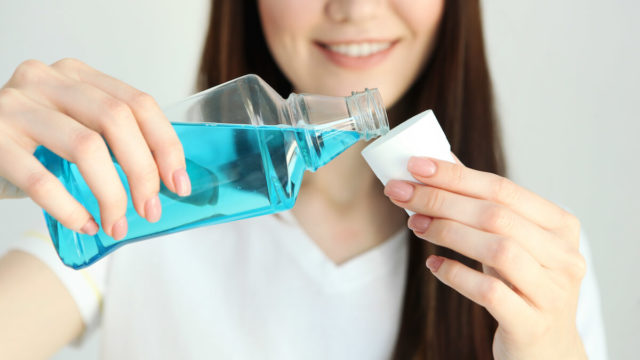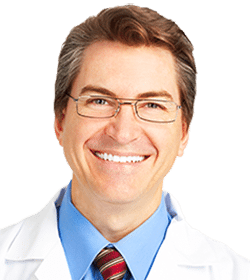At some point, you probably saw an advertisement for a mouthwash with an actor vigorously swishing liquid around their mouth and finishing with a sparkling smile. While mouthwash isn’t going to give you a smile like that actor’s overnight, it could help your oral health. Of course, mouthwash only helps if you use it properly.
With so many products on the market, myths floating around, and misleading commercials, it can be difficult to decide if you need mouthwash in your oral care routine. Let’s talk about mouthwash, what it does, and how to use it properly!
What is Mouthwash?
Mouthwash is a special liquid that usually includes some type of antiseptic to kill bacteria and help clean your teeth, gums, and tongue. It can also combat bad breath and protect your teeth against tooth decay.
We should note that not all mouthwashes have the same effects. Manufacturers can use various ingredients in different concentrations to achieve varying results.
Read more: What are the Benefits of Mouthwash?
What is the Purpose of a Mouthwash?
Mouthwash falls into one of two categories, cosmetic or therapeutic.
- Cosmetic mouthwashes can mask bad breath and leave a fresh taste in your mouth, but they don’t kill bacteria or offer protection against oral health issues, like gingivitis or plaque buildup.
- Therapeutic mouthwashes feature active ingredients that combat specific issues, like bacteria and bad breath.
You can get both types over-the-counter at many local stores, including supermarkets. However, some therapeutic mouthwashes require a prescription from your doctor.
Is Mouthwash Good for Infections?
Yes and no. Some mouthwashes can help with infections. For example, if you choose a mouthwash with antibacterial properties, it can relieve some of the pain and inflammation associated with that infection.
Advantages of Using Mouthwash
As you might suspect, mouthwash can benefit your oral health. If you use it properly and choose the right product to meet your needs, mouthwash could:
- Reduce your risk of tooth decay.
- Reduce debris and plaque buildup on your teeth.
- Eases sores on your gums and soft tissues of the mouth.
- Prevent or manage gingivitis.
- Slow the formation of tartar.
- Freshen your breath.
- Whiten your teeth.
Since every mouth is unique, it’s best to discuss your options with your dentist. They may have recommendations based on your individual needs.
To speak with a dentist about mouthwash options, schedule an appointment at your local Jefferson Dental & Orthodontics.
Can Mouthwash Have Negative Effects?
There are a lot of myths about mouthwash having negative effects, so let’s clear some things up. Like most self-care products, not all mouthwash is created equal, and some can have negative effects on your oral health.
For example, some mouthwashes contain alcohol, which can increase your risk of developing oral cancer. To offset this consequence, try choosing an alcohol-free or all-natural mouthwash.
Additionally, mouthwash can wash away the effects of your toothpaste if used immediately after brushing. It can also leave your teeth unprotected and more sensitive.
Can Mouthwash Damage Your Teeth?
It depends on the type of mouthwash you use. As noted above, those that contain alcohol can be problematic. Additionally, some stronger mouth rinses have side effects, like staining your teeth.
Does Mouthwash Destroy Good Bacteria?
Unfortunately, mouthwash isn’t smart enough to tell the difference between good and bad bacteria. Some antibacterial products can wash away good bacteria with the bad, so it’s important to discuss your options with your dentist.
Choosing a Mouthwash
There are a few things to keep in mind when choosing a mouthwash. First, it should have the ADA seal of acceptance, noting that it’s approved by the American Dental Association. Second, look for one that fights bacteria.
You may be wondering which mouthwash dentists recommend, and the answer would be that it varies. What works well for one person may not be the best oral rinse for another person, so you may want to discuss your options with your dentist.
How To Use Mouthwash
Knowing how to use mouthwash properly is the best way to ensure it helps your smile. Let’s start with some basics about using mouthwash and then answer some common questions about best practices.
- Always follow the manufacturer’s directions for usage.
- Swish the mouthwash around your mouth, being careful not to swallow it.
- Gargle for 30 seconds during your swish session.
- Spit out the mouthwash.
It seems simple, right? Unfortunately, using mouthwash is not necessarily as cut and dry as it seems, and people often have questions about how to use it properly.
What Comes First, Mouthwash or Brushing?
It’s often recommended to brush and floss before using mouthwash. If you use toothpaste with fluoride, you want to wait a bit before using the mouthwash, so it doesn’t wash away the fluoride.
But, Is It OK to Use Mouthwash Before Brushing?
Actually, yes. Some people actually prefer to use mouthwash first because it can break up plaque and move debris from those tough spots. That makes it easier for your toothbrush to do the rest.
How Long Should I Wait to Use Mouthwash After Brushing?
Depending on the type of mouthwash, you may want to wait about 30 minutes after brushing and flossing. Waiting ensures that you don’t undo the benefits of your toothpaste.
Should I Rinse After Using Mouthwash?
No, do not rinse for 30 minutes after using mouthwash.
Can I Use Mouthwash Instead of Brushing at Night?
Unfortunately, mouthwash is not a substitute for brushing and flossing. It can enhance your daily care routine, but not replace it.
Can You Overuse Mouthwash?
It depends. If the mouthwash contains alcohol or fluoride, it’s best to reduce usage to once per day. However, cosmetic mouthwash doesn’t have the same active ingredients, so it may be possible to use it more frequently. As always, it’s in your best interest to follow your dentist’s guidance and the manufacturer’s directions.
Should You Use Mouthwash Before Bed?
Yes! Using an oral rinse before bed can reduce bacteria buildup overnight.
Should You Add Mouthwash to Your Oral Care Routine?
Many mouthwash products can enhance your daily care routine, especially if you struggle with fresh breath or concerns about gingivitis. It’s easy to find a reputable mouthwash at your local grocery store or drug store. If you find that the mouthwash you choose isn’t working, you may want to discuss the situation with your dentist.
If you have more questions about using mouthwash or you have concerns about your oral health, the friendly team at Jefferson Dental & Orthodontics can help. Contact the office nearest you to schedule an appointment!




